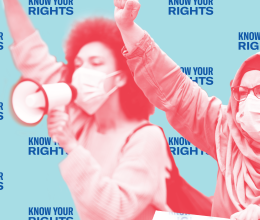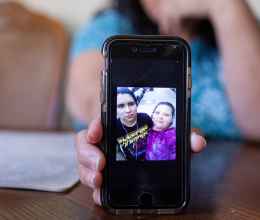
LOS ANGELES, CALIF. - People with disabilities face inhumane treatment and illegal discrimination in the Los Angeles County jail system because it routinely fails to accommodate their needs. Today, civil and disability rights attorneys are filing suit in U.S. District Court to stop the mistreatment.
The suit alleges widespread and pervasive violations related to classification, housing, access to programs and services, medical care, and physical barriers for people with disabilities in L.A. County jails.
'You would expect that in Los Angeles in 2008 any person in the jail would have access to a toilet, a phone and a drink of water,' said Shawna L. Parks, Director of Litigation at the Disability Rights Legal Center (DRLC). 'People with disabilities in Los Angeles County jail are not guaranteed even these basic things.'
In an investigation that included interviews with almost 70 inmates over several months, the civil rights attorneys heard accounts of them having to sit or lie in their own waste for hours because wheelchair-accessible toilets and showers were either non-existent or dangerous, or because guards took away catheter bags that allowed them relief at night. Others had to drag themselves on the floor because they had no access to their wheelchairs or, when they did, bathroom doors weren't wide enough for them.
'There were no grab bars,' said Francis Tribble, an inmate who is in a wheelchair after a car crash shattered his left leg and crushed his feet. 'I had to lower myself out of my wheelchair at the entrance to the toilet and crawl and drag myself along the ground . . . then pull myself up to the seat. The ground was filthy, which made it even worse.'
Other accounts showed some guards' shocking indifference to the plight of their charges.
'I asked a deputy if I could see a doctor,' said Michael Curfman, who is paralyzed on his left side and has a brain injury that impairs his balance. 'I was told that I will see one only if I'm bleeding or dying.'
Curfman requested a wheelchair for his balance problems but was given only a rickety walker after his mother complained to officials. And because toilets and showers have no grab bars, he has often fallen when trying to use them.
"This is the most egregious example of government brutality I have ever witnessed,' said Virginia Keeny, one of the attorneys filing suit. 'These individuals are being treated worse than animals."
The attorneys stressed that many of the plaintiffs, while in jail, have not been prosecuted.
'The victims of the county's inhumane practices include detainees who have never been convicted of a crime,' said Mark Rosenbaum, legal director for the American Civil Liberties Union of Southern California. 'It is as if the county is punishing these detainees for their disabilities, inflicting misery and humiliation on that basis alone.'
An expert's review of the jail system in late 2007 said jail inmates with disabilities face a maze of barriers. It also found that the county's ham-handed way of segregating these inmates relegates them to the worst facilities and bars them from participating in more than 100 programs that can help them lead a productive life upon release.
'It appears that inmates with disabilities have no access at all to the vast majority of programs and services of the L.A. County Jail system,' wrote Logan Hopper, the nationally known expert on disabled accessibility who conducted the review and drafted an accompanying report.
The civil rights coalition that brought the lawsuit comprises attorneys with HellerEhrman LLP and Hadsell, Stormer, Keeny, Richardson & Renick LLP, as well as the ACLU/SC and the DRLC.
'As we began investigating, we were horrified to learn the details of the county's systemic discrimination against inmates with disabilities,' said John Ulin, partner at HellerEhrman. 'We knew we had to get involved.'
The suit followed months of dialogue with the Los Angeles County Sheriff's Department that aimed to improve jail conditions and help the county comply with federal law. The Hopper review was shared with county officials in an effort to resolve the problem without a lawsuit. Attorneys for the inmates proposed a framework for short- and medium-term changes that addressed the worst access barriers, plus a 90-day evaluation of all programs. So far, county representatives have been unwilling to agree to these changes.
'We remain hopeful that this problem can be resolved amicably,' said Melinda Bird, senior counsel for the ACLU/SC. 'The parties continue to meet, and spoke as recently as yesterday afternoon about options for settlement. We are willing to work around the clock to find a mutually agreeable solution that will ensure the security of the jail and still honor and protect the dignity and well-being of inmates and detainees with disabilities.'






